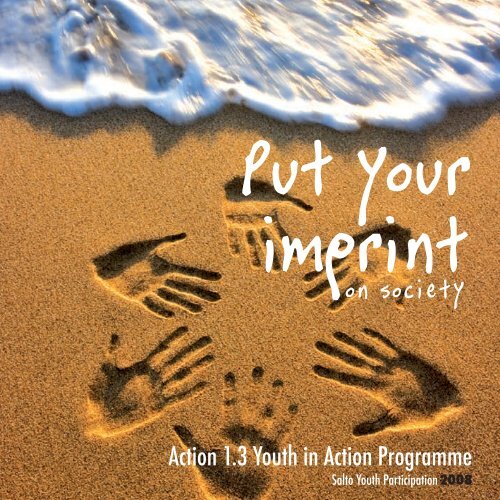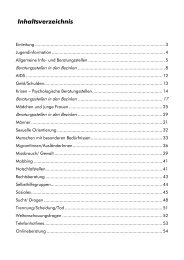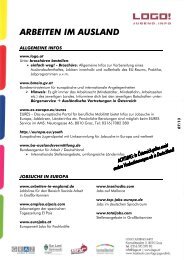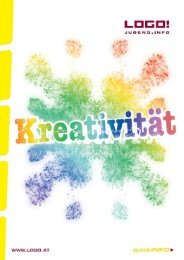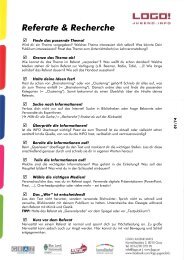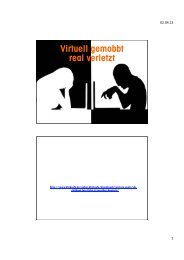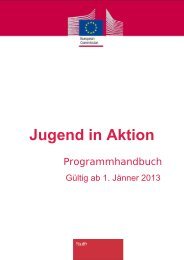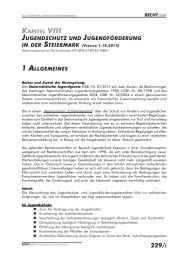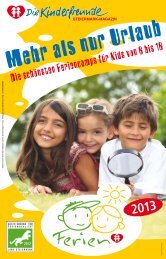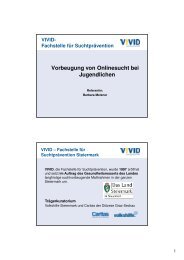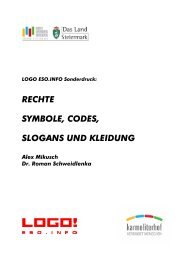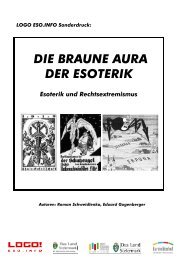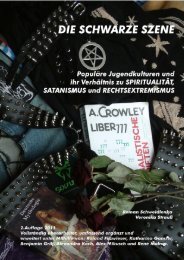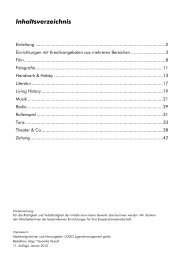Booklet on Action 1.3 Youth Democracy projects - SALTO-YOUTH
Booklet on Action 1.3 Youth Democracy projects - SALTO-YOUTH
Booklet on Action 1.3 Youth Democracy projects - SALTO-YOUTH
Create successful ePaper yourself
Turn your PDF publications into a flip-book with our unique Google optimized e-Paper software.
Put your<br />
imprint<br />
<strong>on</strong> society<br />
Acti<strong>on</strong> <strong>1.3</strong> <strong>Youth</strong> in Acti<strong>on</strong> Programme<br />
Salto <strong>Youth</strong> Participati<strong>on</strong> 2008
Put your<br />
imprint<br />
<strong>on</strong> society<br />
This document does not necessarily express the official views of the European Commissi<strong>on</strong> or the organisati<strong>on</strong>s and pers<strong>on</strong>s cooperating with the <strong>Youth</strong><br />
in Acti<strong>on</strong> instituti<strong>on</strong>s. Put your imprint <strong>on</strong> society aims to be a practical youth work publicati<strong>on</strong> and not an official policy document.
<strong>Youth</strong> In Acti<strong>on</strong> Programme<br />
A C T I O N 1 . 3<br />
Throughout Acti<strong>on</strong> <strong>1.3</strong> <strong>Youth</strong> <strong>Democracy</strong> <strong>projects</strong>, the<br />
<strong>Youth</strong> in Acti<strong>on</strong> Programme aims to support young people<br />
who want to play an active role in society and get more<br />
involved in its democratic processes. Since the launch of<br />
the programme, there has been a huge need expressed by<br />
different stakeholders to promote this acti<strong>on</strong>, to clarify how a<br />
<strong>Youth</strong> <strong>Democracy</strong> project should look and to define its main<br />
pedagogical framework.<br />
Based <strong>on</strong> the activities developed by <strong>SALTO</strong>-<strong>YOUTH</strong><br />
Participati<strong>on</strong> Resource Centre since 2007, this publicati<strong>on</strong><br />
intends to define what a <strong>Youth</strong> <strong>Democracy</strong> project is, gives<br />
some examples of realised <strong>projects</strong> and provides tips to<br />
support their implementati<strong>on</strong>. Furthermore, it is aimed at<br />
transferring the c<strong>on</strong>cepts of the training courses and seminars<br />
“Get Involved” and “Let’s meet for Participati<strong>on</strong>” initiated by<br />
the Resource Centre to support the development of <strong>projects</strong><br />
and partnerships under Acti<strong>on</strong> <strong>1.3</strong>.<br />
<strong>SALTO</strong>-<strong>YOUTH</strong> Participati<strong>on</strong> Resource Centre hopes that<br />
you will enjoy reading this publicati<strong>on</strong> and find it practical and<br />
inspiring.<br />
Fatima LAANAN,<br />
Coordinator<br />
<strong>SALTO</strong>-<strong>YOUTH</strong> Participati<strong>on</strong> Resource Centre<br />
Put your<br />
imprint<br />
<strong>on</strong> society<br />
CONTENTS<br />
Foreword _4<br />
What is a <strong>Youth</strong> <strong>Democracy</strong> Project? _6<br />
Examples of <strong>Youth</strong> <strong>Democracy</strong> Projects _12<br />
Salto <strong>Youth</strong> Participati<strong>on</strong>’s Activities_22<br />
Project planning : It’s your turn_26<br />
Glossary_30
4<br />
Put your imprint <strong>on</strong> society<br />
F O R E W O R D<br />
<strong>Youth</strong> In Acti<strong>on</strong> Programme<br />
GENERAL OVERVIEW OF<br />
THE <strong>YOUTH</strong> IN ACTION<br />
PROGRAMME 2007-2013<br />
With a total budget of 885 milli<strong>on</strong> euros for seven years, the <strong>Youth</strong> in Acti<strong>on</strong> Programme aims to inspire a<br />
sense of active European citizenship, solidarity and tolerance am<strong>on</strong>g young Europeans and to involve them<br />
in shaping the Uni<strong>on</strong>’s future by boosting their participati<strong>on</strong> in democratic life.<br />
The programme promotes n<strong>on</strong>-formal learning and intercultural dialogue am<strong>on</strong>g European youth, and it<br />
encourages young people’s mobility within and bey<strong>on</strong>d the EU borders, thus giving them the opportunity<br />
to expand their horiz<strong>on</strong>s and gain valuable life and work experiences.<br />
The Programme is open to all young people aged between 15 and 28 (in some cases excepti<strong>on</strong>s are<br />
foreseen to involve young people aged between 13 and 30). The involvement of young people with fewer<br />
opportunities is <strong>on</strong>e of its key priorities.<br />
To achieve its objectives, the programme funds a large variety of activities through five acti<strong>on</strong>s. These activities<br />
include youth exchanges, youth initiatives, transnati<strong>on</strong>al voluntary service as well as training and networking<br />
opportunities for youth workers and youth organisati<strong>on</strong>s.<br />
OVERVIEW OF THE ACTIONS OF THE PROGRAMME<br />
_Acti<strong>on</strong> 1<br />
<strong>Youth</strong> for Europe<br />
aims at encouraging young people’s active<br />
citizenship, participati<strong>on</strong> and creativity<br />
by supporting youth exchanges, youth<br />
initiatives and youth democracy <strong>projects</strong>.<br />
_Acti<strong>on</strong> 3<br />
<strong>Youth</strong> in the World<br />
aims at promoting partnerships and<br />
exchanges am<strong>on</strong>g young people and<br />
youth organisati<strong>on</strong>s across the world.<br />
_Acti<strong>on</strong> 2<br />
European Voluntary Service<br />
helps young people to develop their sense<br />
of solidarity by participating, either individually<br />
or in group, in n<strong>on</strong>-profit, unpaid<br />
voluntary activities abroad.<br />
_Acti<strong>on</strong> 4<br />
_Acti<strong>on</strong> 5<br />
<strong>Youth</strong> Support Systems<br />
Support for European<br />
Co-operati<strong>on</strong> in the <strong>Youth</strong> field<br />
supports youth policy co-operati<strong>on</strong> at<br />
European level, in particular by facilitating<br />
dialogue between young people and policy<br />
makers.<br />
IMPLEMENTATION OF THE PROGRAMME<br />
includes various measures to suppor t<br />
youth workers and youth organisati<strong>on</strong>s<br />
and improve the quality of their<br />
activities.<br />
The Programme is mainly implemented in a decentralised way through a network of Nati<strong>on</strong>al Agencies,<br />
which have been established in each Programme Country in order to ensure a closer c<strong>on</strong>tact with the<br />
nati<strong>on</strong>al reality of beneficiaries. The Programme Guide of the <strong>Youth</strong> in Acti<strong>on</strong> Programme, available <strong>on</strong> the<br />
<strong>Youth</strong> website at http://ec.europa.eu/youth/ includes detailed descripti<strong>on</strong>s and eligibility criteria of each<br />
acti<strong>on</strong>.<br />
5<br />
Put your imprint <strong>on</strong> society
6<br />
Put your imprint <strong>on</strong> society<br />
C H A P T E R 1<br />
WHAT IS A <strong>YOUTH</strong> DEMOCRACY PROJECT?<br />
<strong>Youth</strong> <strong>Democracy</strong> Project is the new sub acti<strong>on</strong> <strong>1.3</strong><br />
of the European <strong>Youth</strong> in Acti<strong>on</strong> programme (2007-2013).<br />
It gives young people the opportunity to be directly<br />
involved in society by planning and carrying out a project, which is an<br />
important n<strong>on</strong> formal learning experience.<br />
It encourages young people to c<strong>on</strong>sider their c<strong>on</strong>tributi<strong>on</strong><br />
and involvement in a local, nati<strong>on</strong>al and European c<strong>on</strong>text.<br />
OBJECTIVES<br />
<strong>Youth</strong> <strong>Democracy</strong> Project supports young people’s participati<strong>on</strong> in democratic life.<br />
C<strong>on</strong>cretely, it :<br />
DEFINITION<br />
_Promotes the involvement of young people in participatory structures<br />
_Develops dialogue between public authorities and groups of young people<br />
_Facilitates dialogue between public authorities and young people who are not members of<br />
organisati<strong>on</strong>s<br />
_Creates structures or strategies to bring young people closer to political decisi<strong>on</strong>-making<br />
_Identifies and overcomes obstacles to the participati<strong>on</strong> of young people in democratic life<br />
CRITERIA<br />
Who can realize a <strong>Youth</strong> <strong>Democracy</strong> Project?<br />
√ Promoters<br />
_A n<strong>on</strong> profit organisati<strong>on</strong><br />
_A local or regi<strong>on</strong>al public body<br />
_An informal group of young people (<strong>on</strong>e of the members of the group<br />
assumes the role of representative and takes resp<strong>on</strong>sibility <strong>on</strong> behalf of<br />
the group)<br />
_A body active in the youth field at European level<br />
A project should involve at least 2 countries with 2 local partners per country.<br />
Who can apply?<br />
√ Participants<br />
Young people aged between 13 and 30 and legally resident in a<br />
programme country<br />
The group should c<strong>on</strong>sist of a minimum of 16 young people.<br />
The activity must take place in the country of at least <strong>on</strong>e promoter.<br />
The project can last between 3 and 18 m<strong>on</strong>ths.<br />
One of the promoters assumes the role of coordinator<br />
and applies to the relevant Nati<strong>on</strong>al Agency for the whole<br />
project <strong>on</strong> behalf of all the promoters involved.<br />
When to apply?<br />
_1 st February<br />
_1 st April<br />
_1 st June<br />
_1 st September<br />
_1 st November<br />
7<br />
Put your imprint <strong>on</strong> society
8<br />
Put your imprint <strong>on</strong> society<br />
ELIGIBLE COSTS<br />
QUALITY OF PROJECT DESIGN<br />
Quality of the partnership/active<br />
involvement of all promoters in the project<br />
Promoters must dem<strong>on</strong>strate the ability to establish<br />
and run a cohesive partnership with the active<br />
involvement of all partners and with comm<strong>on</strong> goals<br />
to be achieved. The setting-up of a partnership composed<br />
of promoters from different backgrounds<br />
may facilitate the implementati<strong>on</strong> of the Activity.<br />
Quality of the preparati<strong>on</strong> phase<br />
During this phase, the promoters should agree<br />
<strong>on</strong> the comm<strong>on</strong> theme of the <strong>Youth</strong> <strong>Democracy</strong><br />
Project. They should think about the divisi<strong>on</strong> of<br />
tasks, the activity programme, working methods,<br />
profile of participants, practical arrangements (venue,<br />
transfers, accommodati<strong>on</strong>, support material,<br />
linguistic support).<br />
Quality of Activity programme<br />
The Activity programme should be clearly defined,<br />
realistic, balanced and linked to the objectives<br />
of the project and of the <strong>Youth</strong> in Acti<strong>on</strong><br />
Programme.<br />
Quality of the evaluati<strong>on</strong> phase<br />
Promoters and participants are expected to include<br />
a final evaluati<strong>on</strong> process. The final evaluati<strong>on</strong><br />
should make it possible to assess whether<br />
the objectives of the project have been achieved<br />
and the expectati<strong>on</strong>s of the promoters and participants<br />
have been met. The evaluati<strong>on</strong> should also<br />
highlight the learning outcomes.<br />
9<br />
Put your imprint <strong>on</strong> society
10<br />
Put your imprint <strong>on</strong> society<br />
Themes of comm<strong>on</strong> interest and relevance<br />
to the group of participants<br />
The project should have a clear thematic c<strong>on</strong>cept,<br />
which promoters wish to explore together. The<br />
theme has to be translated into the c<strong>on</strong>crete daily<br />
activities of the <strong>Youth</strong> <strong>Democracy</strong> Project.<br />
N<strong>on</strong>-formal learning methods applied<br />
The project should follow the principles of n<strong>on</strong>formal<br />
learning. In general terms, the project<br />
should be based <strong>on</strong> an intercultural learning process<br />
stimulating creativity, active participati<strong>on</strong> and<br />
initiative.<br />
Active involvement of participants<br />
in the project<br />
The Activity programme and working methods<br />
applied should involve the participants as much<br />
as possible.<br />
QUALITY OF PROJECT CONTENT<br />
AND METHODOLOGY<br />
Promoti<strong>on</strong> of social and pers<strong>on</strong>al<br />
development of participants<br />
The project should enable the participants to acquire<br />
self-c<strong>on</strong>fidence.<br />
Intercultural dimensi<strong>on</strong><br />
The <strong>Youth</strong> <strong>Democracy</strong> Project should increase<br />
young people’s positive awareness of other cultures<br />
and support dialogue and intercultural encounters<br />
with other young people from different<br />
backgrounds and cultures.<br />
European dimensi<strong>on</strong><br />
The <strong>Youth</strong> <strong>Democracy</strong> Project should c<strong>on</strong>tribute<br />
to the young people’s educati<strong>on</strong> process and increase<br />
their awareness of the European/internati<strong>on</strong>al<br />
c<strong>on</strong>text in which they live.<br />
Impact, multiplying effect and follow-up<br />
Promoters should try, as much as possible, to<br />
involve other people (from the neighbourhood,<br />
local area, etc.) in the project activities. Multiplicati<strong>on</strong><br />
is obtained for instance by c<strong>on</strong>vincing other<br />
actors to use the results of the <strong>Youth</strong> <strong>Democracy</strong><br />
Project in a new c<strong>on</strong>text.<br />
Promoters and participants are called to reflect<br />
systematically up<strong>on</strong> possible measures to ensure<br />
a follow-up of the <strong>Youth</strong> <strong>Democracy</strong> Project.<br />
Visibility of the project/visibility of the<br />
<strong>Youth</strong> in Acti<strong>on</strong> Programme<br />
_Visibility of the project: SMS mailing; prepare<br />
posters, stickers, promoti<strong>on</strong>al items (t-shirts, caps,<br />
pens, etc.); invite journalists to observe; issue ‘press<br />
releases’ or write articles for local papers, websites<br />
or newsletters; create an e-group, a web space, a<br />
photo-gallery or blog <strong>on</strong> the Internet, etc.<br />
_Visibility of the <strong>Youth</strong> in Acti<strong>on</strong> Programme: use<br />
of the official <strong>Youth</strong> in Acti<strong>on</strong> logo, seminars,<br />
c<strong>on</strong>ferences, debates organised at different levels<br />
(local, regi<strong>on</strong>al, nati<strong>on</strong>al, internati<strong>on</strong>al).<br />
QUALITY OF PROJECT REACH<br />
Disseminati<strong>on</strong> and exploitati<strong>on</strong> of results<br />
Organising public events (presentati<strong>on</strong>s, c<strong>on</strong>ferences,<br />
workshops…); creating audio-visual products<br />
(CD-Rom,DVD…); setting up l<strong>on</strong>g-term collaborati<strong>on</strong><br />
with media (series of radio/TV/press<br />
c<strong>on</strong>tributi<strong>on</strong>s, interviews, participati<strong>on</strong> in different<br />
radio/TV programmes…); developing informati<strong>on</strong><br />
material (newsletters, brochures, booklets, best<br />
practice manuals…); creating an Internet portal,<br />
etc.<br />
11<br />
Put your imprint <strong>on</strong> society
12<br />
Put your imprint <strong>on</strong> society<br />
C H A P T E R 2<br />
EXAMPLES OF <strong>YOUTH</strong> DEMOCRACY PROJECT<br />
YOUNG PEOPLE, ACTORS AND<br />
RESOURCES IN THE PUBLIC SECTOR<br />
Celine GOMEZ Universite du citoyen 66, avenue Gambetta 83500 La Seyne sur Mer ucvar@aol.com<br />
Title Les jeunes, acteurs et resources dans 1’espace public/Young people, actors and<br />
resources from the public sector<br />
Durati<strong>on</strong><br />
Beneficiary<br />
Partnership<br />
From the 1 st July 2007 to the 31 st July 2008<br />
Partner l University of Citizen (France)<br />
28 participants took part in the project: - 14 young people elected from<br />
the C<strong>on</strong>sultative Council of Arles - 14 young actors from the participative analyse<br />
of the City of Rome<br />
Partner 2 Ville d’Arles, service animati<strong>on</strong> - public local authority(France)<br />
Partner 3 Municipio di Roma - public local authority (Italy)<br />
Partner 4 Associati<strong>on</strong> ARETES «sviluppi possibiti» (Italy)<br />
How did you come up with the idea?<br />
The partnership between Arles and Rome has<br />
existed for a l<strong>on</strong>g time. The project initiated by<br />
the «Citizen University» based <strong>on</strong> l<strong>on</strong>g term experience<br />
in the field of participati<strong>on</strong> of inhabitants<br />
especially in the field of democracy. The idea was<br />
to extend this knowledge to the partnership and<br />
encourage young people from 15 to 30 to collaborate<br />
in a European experience.<br />
Objectives<br />
_Gather experiences and exchange analyses of<br />
young people in the field of participative process<br />
in both countries;<br />
_Identify needs to improve existing processes or<br />
create new <strong>on</strong>es;<br />
_Launch the debate <strong>on</strong> participati<strong>on</strong> processes of<br />
young people without discriminati<strong>on</strong>;<br />
_Establish a think tank and make proposals for the<br />
collective interest.<br />
Str<strong>on</strong>g points of the project<br />
The experience of the Citizen University in the<br />
field of participative methodology was definitely a<br />
str<strong>on</strong>g point. This experience could be shared and<br />
was the starting point of the <strong>Youth</strong> <strong>Democracy</strong><br />
project.<br />
The cooperati<strong>on</strong> between the two Town halls<br />
was also a good point. The mobilizati<strong>on</strong> of local<br />
authorities helped to encourage the awareness of<br />
young people that they are real resources for the<br />
collective policy.<br />
Budget<br />
Total amount: 30 840€<br />
60% <strong>Youth</strong> in Acti<strong>on</strong> programme<br />
40% City of Aries (human resources, food, bus<br />
and cultural visits)<br />
Brief descripti<strong>on</strong> and aim<br />
of the project<br />
«This project offered the chance to propose an<br />
European experience between young people<br />
from both countries. It aimed to use the experiences<br />
of the «Citizen University» of Arles in participative<br />
processes. Through this comm<strong>on</strong> project,<br />
we wanted to help young people interested in<br />
developing their capacity for exchange and reflecti<strong>on</strong>,<br />
improve and valorize their European identity<br />
and train them to have their say. At the end of this<br />
cooperati<strong>on</strong> participants should be fully aware of<br />
their role as resources within the public sector<br />
and be able to use their skills to become actors<br />
at local level.»<br />
Difficulties the partnership faced and<br />
advice to give other associati<strong>on</strong>s<br />
«We encountered difficulties with the planning of<br />
the project. It was hard to find availability at the<br />
same time in both countries. Language was also a<br />
problem at the beginning but was naturally overcome<br />
through different means of communicati<strong>on</strong><br />
and by the synergy of the group which became<br />
str<strong>on</strong>ger and str<strong>on</strong>ger with time. If we had to give<br />
advice to another associati<strong>on</strong> eager to run such<br />
an initiative, it would be to develop a clear and<br />
precise methodology and think carefully about<br />
how they intend to develop the project in order<br />
to facilitate an efficient participative approach.»<br />
13<br />
Put your imprint <strong>on</strong> society
14<br />
Put your imprint <strong>on</strong> society<br />
GOOD PARTICIPATION<br />
BETTER COMMUNICATION!<br />
Title<br />
Durati<strong>on</strong><br />
Beneficiary<br />
Partnership<br />
Good participati<strong>on</strong> - Better communicati<strong>on</strong>!<br />
From October 2007 till March 2009<br />
Partner 1 Jugend und Familienstiftung des Landes<br />
Berlin Foundati<strong>on</strong> under public law<br />
Partner 2 Drehscheibe Kinder und jugendpolitik<br />
Berlin Foundati<strong>on</strong> (Germany)<br />
Partner 3 Jeugd en Stad vzw (JES)<br />
NGO (Belgium)<br />
How did you come up with the idea?<br />
For many years «JFLB» has been supporting <strong>projects</strong><br />
in 2 areas:<br />
1) promoting media skills am<strong>on</strong>g children and<br />
young people<br />
2) strengthening participati<strong>on</strong> of youngsters.<br />
The foundati<strong>on</strong>s are already used for collaborating<br />
with many partners in the network and the JES<br />
and Drehscheibe partnership is <strong>on</strong>ly <strong>on</strong>e example.<br />
Thus the idea of uniting participatory youth<br />
work and media educati<strong>on</strong> in a project was born.<br />
Objectives<br />
_Favorise bilateral exchange of ideas and experiences<br />
through workshops and meetings;<br />
_Raise awareness within policy and public administrati<strong>on</strong><br />
for participati<strong>on</strong> and to support<br />
local structures/<strong>projects</strong> in public participati<strong>on</strong>;<br />
_Find skills to improve daily living c<strong>on</strong>diti<strong>on</strong>s for<br />
young people;<br />
_Develop better opportunities for social integrati<strong>on</strong><br />
and active participati<strong>on</strong> in their<br />
surroundings;<br />
_Open public spaces giving young people the opportunity<br />
to get actively involved in<br />
democratic and social processes which influence<br />
their living c<strong>on</strong>diti<strong>on</strong>s;<br />
_Elaborate media products for facilitating communicati<strong>on</strong><br />
with political decisi<strong>on</strong> makers as well<br />
as between the different project groups to promote<br />
better understanding;<br />
_Develop new c<strong>on</strong>cepts for the future<br />
_Elaborate media supports<br />
Budget<br />
Total amount: 50 495€<br />
27 500€ <strong>Youth</strong> in Acti<strong>on</strong> programme<br />
21% JFLB + drehscheibe<br />
19% JES<br />
Brief descripti<strong>on</strong> and aim<br />
of the project<br />
«The main objective of our project is to design a<br />
child and youth friendly city with newly designed<br />
public spaces by and for young people. Special<br />
attenti<strong>on</strong> will be paid to young people with migrati<strong>on</strong><br />
backgrounds. Participants will develop and<br />
implement <strong>projects</strong> according to their needs. The<br />
political aims of these guidelines are: good participati<strong>on</strong><br />
- better communicati<strong>on</strong>»<br />
Difficulties the partnership faced and<br />
advice to give other associati<strong>on</strong>s<br />
«A growing gap between their desire to be a child<br />
and youth friendly society and reality (e.g: neighbours<br />
complain about the noise in children’s playgrounds).<br />
Interests of children and youngsters being excluded<br />
from the design of public spaces etc… Policy<br />
resp<strong>on</strong>ds <strong>on</strong>ly to request. C<strong>on</strong>siderati<strong>on</strong> of the<br />
interests of children and youngsters is still not<br />
regarded as a crucial issue. Children and teenagers<br />
are often seen through their problems and<br />
not their skills. But... they are experts in their own<br />
matters!»<br />
Str<strong>on</strong>g points of the project<br />
For the first time, two areas of youth work get<br />
together: participati<strong>on</strong> and media educati<strong>on</strong>.<br />
The project uses existing youth <strong>projects</strong> and helps<br />
them in their work.<br />
The project helps young people to communicate<br />
their interests to third parties.<br />
The project promotes media-competences and<br />
thereby strengthens the opportunities to participate<br />
in the democratic processes of society.<br />
15<br />
Put your imprint <strong>on</strong> society
16<br />
Put your imprint <strong>on</strong> society<br />
Title<br />
Durati<strong>on</strong><br />
Beneficiary<br />
Partnership<br />
Damian PAYTON DigitalME Radiowaves 30-34 Aire street Leeds - The UK<br />
Voice It Europe<br />
VOICE IT EUROPE<br />
From September 2007 to March 2008<br />
Partner l DigitalME - (the UK)<br />
Sixteen young people aged between 13 and 19 - half from the UK, half<br />
from :<br />
Latvia are collaborating <strong>on</strong> this project.<br />
Partner 2 iEARN UK - associati<strong>on</strong> (the UK)<br />
Partner 3 <strong>Youth</strong> dub «Lingua» - public local authority (Latvia)<br />
Partner 4 NGO «Lingua.» - associati<strong>on</strong> (Latvia)<br />
How did you come up with the idea?<br />
The first group is from the UK and already involved<br />
in Voice It - a project supported by the Ministry<br />
of Justice to increase democratic engagement<br />
in the UK. Their partner group is an English Club<br />
at a high school in Latvia.<br />
The UK group will bring its experience of Voice<br />
it in the UK, which has already completed a successful<br />
pilot phase. The sec<strong>on</strong>d group will bring<br />
its own outlook as a recent EU entrant. They will<br />
exchange and share ideas about European democratic<br />
structures.<br />
Objectives<br />
_Get to meet and interview their elected representatives<br />
at each of these levels;<br />
_Explore how media tools can be used to make<br />
them active citizens;<br />
_Find a way to access politicians whose decisi<strong>on</strong>s<br />
affect their lives;<br />
_Plan, produce and publish programmes based <strong>on</strong><br />
interviews with their peers and elected representatives;<br />
_Upload the edited pieces to their own space <strong>on</strong><br />
the global Radiowaves website;<br />
_Make them available as podcasts to a worldwide<br />
audience of people who need and want to know<br />
how young people think.<br />
Str<strong>on</strong>g points of the project<br />
The most outstanding characteristic is the use<br />
of the very latest self-publishing technology to<br />
discuss serious issues. Podcasts, blogs and social<br />
networking are enormously influential new movements,<br />
especially for young people.<br />
Brief descripti<strong>on</strong> and aim<br />
of the project<br />
«Voice It Europe is about young people using<br />
the power of podcasts to report <strong>on</strong> issues that<br />
matter to them. They use their own web space<br />
to investigate and campaign <strong>on</strong> local, nati<strong>on</strong>al and<br />
European topics.<br />
Participants are working together using «Web<br />
2.0» technology: self-publishing, voting in polls,<br />
sharing c<strong>on</strong>tent. Thanks to this project, participants<br />
can be trained in journalistic skills and given<br />
the c<strong>on</strong>fidence to arrange and c<strong>on</strong>duct interviews<br />
with influential people who might normally<br />
appear «out of reach».<br />
Difficulties the partnership faced and<br />
advice to give other associati<strong>on</strong>s<br />
«The young Latvian participants have more limited<br />
access to technology than their UK counterparts.<br />
While this has not prevented the project<br />
from running as planned, it has required careful<br />
organisati<strong>on</strong> to ensure that the tools are available.<br />
Another obstacle has obviously been the geographical<br />
distance between the participants. While a<br />
key aspect of Voice it Europe is bridging the divide<br />
between people using technology, it is inevitable<br />
that people will always work more easily together<br />
if they have more opportunities to meet face to<br />
face. A final obstacle worth menti<strong>on</strong>ing is the<br />
other demands <strong>on</strong> the participants’ time. They are<br />
at busy stages in school, so have limited time to<br />
devote to this activity».<br />
Budget<br />
Total amount: 36 053€<br />
60% <strong>Youth</strong> in Acti<strong>on</strong> programme<br />
40% digitalME and IEARN (in-kind c<strong>on</strong>tributi<strong>on</strong>)<br />
17<br />
Put your imprint <strong>on</strong> society
18<br />
Put your imprint <strong>on</strong> society<br />
Mara GEORGESCU Associati<strong>on</strong> ARCIRAGAZZI Liguria Salita M<strong>on</strong>tebeUo, 7/12 16126 Genoa Georgescu.mara@gmail.com<br />
Title «Take acti<strong>on</strong>»: a European ABC to youth participati<strong>on</strong>!<br />
Durati<strong>on</strong><br />
Beneficiary<br />
Partnership<br />
TAKE ACTION: A EUROPEAN ABC<br />
TO <strong>YOUTH</strong> PARTICIPATION!<br />
From November 2007 to January 2009<br />
Partner l ARCIRAGAZZI Liguria (Italy)<br />
The project is run by two countries (Italy and Romania). Within the partnership,<br />
there are 2 youth associati<strong>on</strong>s and 2 local public bodies. 30 young people are<br />
participating in this project.<br />
Partner 2 Town Hall of Genoa - associati<strong>on</strong> (Italy)<br />
Partner 3 Town hall of Bucharest, Office for Educati<strong>on</strong>al Activities -public local<br />
authority (Romania)<br />
Partner 4 Associati<strong>on</strong> APSS «Agenda 21» - public local authority (Italy)<br />
How did you come up with the idea?<br />
The idea of the project was developed during<br />
several meetings with young people. There was<br />
a pooling of ideas about youth participati<strong>on</strong> <strong>projects</strong>.<br />
The Italian Nati<strong>on</strong>al Agency guided us in the<br />
definiti<strong>on</strong> of the final idea.<br />
Brief descripti<strong>on</strong> and aim<br />
of the project<br />
Our aim was to create str<strong>on</strong>ger and more sustainable<br />
b<strong>on</strong>ds between the three main actors of<br />
youth participati<strong>on</strong>: young people, associati<strong>on</strong>s (civil<br />
society in general) and public bodies, according<br />
to the principles of representative democracy.<br />
All the <strong>projects</strong> create spaces and opportunities<br />
for favorising the exchange of ideas and good<br />
practices, actively reflecting <strong>on</strong> the future of Europe<br />
and youth policies in Europe- including from<br />
the perspective of a new EU country, and establishing<br />
the basis for improving public dialogue.<br />
Objectives<br />
_Recognize and support youth participati<strong>on</strong> activities,<br />
<strong>projects</strong> and initiatives developed<br />
at local and regi<strong>on</strong>al level in partner countries;<br />
_Develop a strategy to reinforce democracy in 2<br />
countries through a n<strong>on</strong>-formal learning process<br />
with young people, instituti<strong>on</strong>s and associati<strong>on</strong>s;<br />
_Find skills for helping young people to use the<br />
existing opportunities at local, regi<strong>on</strong>al, nati<strong>on</strong>al<br />
and European level <strong>on</strong> youth participati<strong>on</strong>;<br />
_Elaborate a youth-friendly guide to participati<strong>on</strong><br />
and citizenship c<strong>on</strong>cerned with activities at both a<br />
local and European level.<br />
Budget<br />
The <strong>Youth</strong> in Acti<strong>on</strong> programme: 60% of the project<br />
18% Agenda 21 Bucharest and the City of Bucharest<br />
15% Arciragazzi Liguria (in kind co-financcment)<br />
7% Town hall of Genoa<br />
Town hall of Bucarest<br />
Arciragazzi and other associati<strong>on</strong>s: in kind c<strong>on</strong>tributi<strong>on</strong><br />
Str<strong>on</strong>g points of the project<br />
The project has several features that make it special.<br />
First of all, young people have been involved<br />
in each phase of the elaborati<strong>on</strong> process of the<br />
project in Italy as well as in Romania. Moreover,<br />
the project involved 2 countries with a different<br />
«traditi<strong>on</strong> of democracy» which may for us<br />
be <strong>on</strong>e step towards wider tolerance, the fight<br />
against cultural stereotypes and a step toward<br />
mutual knowledge and understanding. Finally, the<br />
final product of the project is innovative and useful.<br />
We will elaborate a guide of good practices.<br />
Difficulties the partnership faced and<br />
advice to give other associati<strong>on</strong>s<br />
«One of the most important obstacles was to<br />
understand the rules and assessment of the new<br />
European <strong>Youth</strong> in Acti<strong>on</strong> programme. It was not<br />
easy to have a clear idea what kind of expenses<br />
this sub acti<strong>on</strong> could cover or not. There is still<br />
some c<strong>on</strong>fusi<strong>on</strong>...The bureaucracy and the delay<br />
were also a bit frustrating sometimes. Then we<br />
have to admit that finding co-funding is maybe the<br />
hardest part of the project. Especially if 2 organisati<strong>on</strong>s,<br />
from two different countries work together<br />
and d<strong>on</strong>’t have the same system of fundraising.<br />
In the end we were able to find co-funding but<br />
we were not able to valorise enough the work<br />
of volunteers here in our organisati<strong>on</strong>. Cultural<br />
differences were also an obstacle sometimes. If in<br />
<strong>on</strong>e country, everything is organised <strong>on</strong> time, in<br />
the other country there can be «cultural delays».<br />
Finally there is still an overall lack of social investment<br />
in youth. Sometimes, you may think no <strong>on</strong>e<br />
really wants young people to be empowered.<br />
«First of all, read the Programme Guide. Read<br />
it ten times and understand every single word,<br />
because it is written for professi<strong>on</strong>als of project<br />
management, not for average young people...<br />
Sec<strong>on</strong>d, find some<strong>on</strong>e that can help you in keeping<br />
to the cost plan.<br />
Third, find reliable partners. You may not always<br />
get the city in the project, but whoever you get,<br />
make sure they are a sustainable partner.<br />
Ask the nati<strong>on</strong>al agency every questi<strong>on</strong> that comes<br />
to mind before answering it yourself. Sometimes,<br />
the Nati<strong>on</strong>al Agencies understand things differently<br />
to us. Take a lot of pictures and document<br />
every single activity. You may need them in order<br />
to show your results.»<br />
19<br />
Put your imprint <strong>on</strong> society
20<br />
Put your imprint <strong>on</strong> society<br />
Albert FUCIK Rennweg 29 6020 Innsbruck - Austria Albert.fucik@chello.at<br />
Title Future city<br />
Durati<strong>on</strong><br />
Beneficiary<br />
Partnership<br />
From March 2008 till September 2008<br />
How did you come up with the idea?<br />
Albert Fucik, the manager of the project, went to<br />
Feldkirch in Vorarlberg which is in Austria. There<br />
he saw die Kinderstadt «City of Children» which<br />
fascinated him. So he decided to do something similar<br />
in the Tyrol. He extended the idea and created<br />
this innovative project for young people.<br />
FUTURE CITY<br />
Partner 1 Dachverband der Jugendgemeinderate Baden-Wurtemberg<br />
associati<strong>on</strong> (Germany)<br />
Partner 2 Kreisjugendring - regi<strong>on</strong>al public authority (Germany)<br />
Partner 3 Jeugendgruppe Ainet - informal <strong>Youth</strong> group from Eastern Tyrol<br />
(Austria)<br />
Brief descripti<strong>on</strong> and aim<br />
of the project<br />
The «zukunftsstadt» is a fictitious city invented by<br />
and for children and young people. In this fictitious<br />
city, young people are able to make their<br />
own decisi<strong>on</strong>s and are actively involved in the<br />
democratic process. Through their c<strong>on</strong>tributi<strong>on</strong><br />
they influence the development of the project. In<br />
this city children have for example the chance to<br />
study at university, start a business or a political<br />
career. They can assume any role which exists in a<br />
real city. There will be political electi<strong>on</strong>s. They can<br />
present themselves as candidates or vote for each<br />
other. The keeping of the electi<strong>on</strong> pledge and its<br />
c<strong>on</strong>sequences directly affects both the children<br />
and young people. Every<strong>on</strong>e is faced with migrati<strong>on</strong><br />
almost daily. They have to deal with different<br />
languages, cultures and religi<strong>on</strong>s. Special attenti<strong>on</strong><br />
will be paid to the integrati<strong>on</strong> of young people<br />
whose mother t<strong>on</strong>gue is not German.<br />
Objectives<br />
_Bring together the ideas of young people from<br />
different European regi<strong>on</strong>s<br />
_Give young people an understanding of participati<strong>on</strong><br />
_Support different competences<br />
_Support political educati<strong>on</strong><br />
_Get our theme across to children, young people<br />
and adults<br />
_Sensitize young people to Policy and Ec<strong>on</strong>omy<br />
_Support integrati<strong>on</strong> (culture, people with disabilities,<br />
generati<strong>on</strong>s)<br />
_Impact political and ec<strong>on</strong>omic awareness.<br />
_Give young people the possibility to experience<br />
the sustainability and c<strong>on</strong>sequences of<br />
decisi<strong>on</strong>s.<br />
Budget<br />
Total amount: 76 442 €<br />
32.2% <strong>Youth</strong> in Acti<strong>on</strong> programme<br />
19.63% Land Tirol<br />
19.62% sp<strong>on</strong>sors<br />
15.70% entrance fee<br />
12.35% d<strong>on</strong>ati<strong>on</strong><br />
Difficulties the partnership faced and<br />
advice to give other associati<strong>on</strong>s<br />
It’s very difficult to keep to the time schedule because<br />
<strong>on</strong>ly the youngsters themselves make the<br />
decisi<strong>on</strong>s. Having to decide everything is difficult<br />
for them. New steps can <strong>on</strong>ly be taken if a decisi<strong>on</strong><br />
is made.<br />
Str<strong>on</strong>g points of the project<br />
This is <strong>on</strong>e of the few <strong>projects</strong> which really<br />
c<strong>on</strong>cerns democracy. In our city, everything is determined<br />
by young people. Adults <strong>on</strong>ly make sure<br />
that the basic c<strong>on</strong>diti<strong>on</strong>s are provided. Moreover,<br />
we set a high value <strong>on</strong> integrati<strong>on</strong>. For example<br />
you can see different languages (Serbian, Croatian,<br />
Bosnian, and Turkish) <strong>on</strong> our webpage. Languages,<br />
cultures or religi<strong>on</strong> should not be a barrier to participating<br />
in our project.<br />
21<br />
Put your imprint <strong>on</strong> society
22<br />
Put your imprint <strong>on</strong> society<br />
C H A P T E R 3<br />
<strong>SALTO</strong> <strong>YOUTH</strong> PARTICIPATION’S ACTIVITIES<br />
<strong>SALTO</strong> <strong>YOUTH</strong> PARTICIPATION<br />
Since <strong>SALTO</strong>-<strong>YOUTH</strong> Participati<strong>on</strong> has been in<br />
charge of the European priority of PARTICIPA-<br />
TION, it has developed support, informati<strong>on</strong> and<br />
training <strong>on</strong> <strong>Youth</strong> Participati<strong>on</strong>, with the aim of<br />
encouraging young people to involve themselves<br />
in their communities and to promote two essential<br />
sub acti<strong>on</strong>s of the European <strong>Youth</strong> in Acti<strong>on</strong><br />
programme: Transnati<strong>on</strong>al <strong>Youth</strong> Initiatives (1.2)<br />
and <strong>Youth</strong> <strong>Democracy</strong> Projects (<strong>1.3</strong>):<br />
_Sub acti<strong>on</strong> 1.2: <strong>Youth</strong> Initiatives : follow<br />
up and transfer of good practices to Nati<strong>on</strong>al<br />
Agencies, focus <strong>on</strong> active participati<strong>on</strong> of young<br />
people<br />
_Sub acti<strong>on</strong> <strong>1.3</strong>: <strong>Youth</strong> <strong>Democracy</strong><br />
Project: This is a new acti<strong>on</strong>. <strong>SALTO</strong>-<strong>YOUTH</strong><br />
Participati<strong>on</strong> has the task of promoting and<br />
enhancing its development.<br />
<strong>SALTO</strong>-<strong>YOUTH</strong> Participati<strong>on</strong> works with Nati<strong>on</strong>al<br />
Agencies and youth trainers to enhance the<br />
quality of <strong>projects</strong> within these 2 sub acti<strong>on</strong>s.<br />
METHODS USED<br />
Through its experience of seminars and training courses, <strong>SALTO</strong>-<strong>YOUTH</strong> Participati<strong>on</strong><br />
has developed a wide range of tools and c<strong>on</strong>crete tips, in order to clarify and<br />
support the implementati<strong>on</strong> of acti<strong>on</strong> <strong>1.3</strong> of the <strong>Youth</strong> in Acti<strong>on</strong> programme. You<br />
will find below a summary of the results of all activities organised by the resource<br />
centre in this regard. You will also see how useful these elements are for realizing<br />
your own <strong>Youth</strong> <strong>Democracy</strong> Project.<br />
Get involved TC c<strong>on</strong>cept<br />
applicati<strong>on</strong><br />
YiA<br />
Generating &<br />
developing ideas<br />
check planning<br />
23<br />
Put your imprint <strong>on</strong> society
24<br />
Put your imprint <strong>on</strong> society<br />
Salto’s methodological approach<br />
_Principles and practice of n<strong>on</strong> formal educati<strong>on</strong> taking into<br />
account participant’s needs, expectati<strong>on</strong>s, motivati<strong>on</strong> and previous<br />
experience as a starting point for the planned activities.<br />
_Balance of informati<strong>on</strong> brought by the team (instructi<strong>on</strong>, transmissi<strong>on</strong>)<br />
and participants (experience sharing, ideas, remarks).<br />
_Diversity of methods in a way that fits all learning styles and<br />
combines acti<strong>on</strong> and reflecti<strong>on</strong>, speculati<strong>on</strong> and creativity.<br />
_Work <strong>on</strong> c<strong>on</strong>crete <strong>projects</strong> in order to create the necessary basis<br />
for future development and applicati<strong>on</strong>.<br />
_Integrated c<strong>on</strong>sultati<strong>on</strong> and feedback <strong>on</strong> the project ideas so<br />
that these become more “realistic” and comply with the Acti<strong>on</strong>’s<br />
specificities.<br />
_Resource table with brochures, books and other materials useful<br />
for participants.<br />
_Facilitated reflecti<strong>on</strong> at the end of each programme day, so that<br />
learning is ensured and participants “have a say” in the way the<br />
activities are d<strong>on</strong>e and the c<strong>on</strong>tent within them.<br />
_Energizers, ice-breakers, mood lifters as a means to achieving<br />
this way closer b<strong>on</strong>ds between participants, well being during the<br />
course and the necessary empowerment to go <strong>on</strong> afterwards.<br />
Working principles<br />
_Group dynamics developed through different activities and getting<br />
to know each-other <strong>on</strong> an individual, pers<strong>on</strong>al and professi<strong>on</strong>al level<br />
as well as understanding cultural differences/similarities through<br />
different forms of presentati<strong>on</strong>, problem solving, intercultural party<br />
and different teams c<strong>on</strong>tributing to good group and working<br />
atmosphere.<br />
_Informati<strong>on</strong> about the seminar, its objectives, team and methodology<br />
used c<strong>on</strong>tributed to the orientati<strong>on</strong>, trust development and<br />
building of a safe envir<strong>on</strong>ment.<br />
_Introducti<strong>on</strong> of the c<strong>on</strong>cepts of <strong>Youth</strong> Participati<strong>on</strong> and <strong>Youth</strong><br />
<strong>Democracy</strong> Projects by experts and different stakeholders in the<br />
field (<strong>SALTO</strong> Ressource Centre, European <strong>Youth</strong> Forum, and<br />
Council of Europe) and debating with them was necessary to<br />
achieve comm<strong>on</strong> basic knowledge and to provoke questi<strong>on</strong>s and<br />
interest.<br />
_Developing comm<strong>on</strong> understanding about essential terms of Acti<strong>on</strong><br />
<strong>1.3</strong>: partnership, participati<strong>on</strong> and authority.<br />
_Quality elements in Acti<strong>on</strong> <strong>1.3</strong> and good practices were explored<br />
through work <strong>on</strong> the participant’s prior experiences, role playing,<br />
discussi<strong>on</strong>s and getting to know participati<strong>on</strong> <strong>projects</strong>.<br />
_Seminars also had a c<strong>on</strong>tact making comp<strong>on</strong>ent allowing participants<br />
to present their project ideas and encouraging them to find<br />
partners and develop their ideas.<br />
_Evaluati<strong>on</strong>s were <strong>on</strong>going with daily reflecti<strong>on</strong>s and evaluati<strong>on</strong><br />
<strong>on</strong> the “Open Team Meetings”. The success and accomplishment of<br />
the learning objectives were measured by pre- and post-evaluati<strong>on</strong><br />
questi<strong>on</strong>naires.<br />
_Group spirit was an essential element. The team and participants<br />
c<strong>on</strong>tributed c<strong>on</strong>stantly in formal and in-formal time by participating<br />
in Open Team Meetings, proposing and leading some programme<br />
activities, initiating parties, organising teams for cleaning, developing<br />
group stories and memories.<br />
The ladder of<br />
participati<strong>on</strong><br />
3.Tokenism<br />
2.Decorati<strong>on</strong><br />
1.Manipulati<strong>on</strong><br />
7.Child initiated<br />
and directed<br />
6.Adult initiated shared<br />
decisi<strong>on</strong>s with kids<br />
5.C<strong>on</strong>sulted<br />
and informed<br />
4.Assigned but<br />
informed<br />
8.Child initiated shared<br />
decisi<strong>on</strong>s with adults<br />
w w w . s a l t o - y o u t h . n e t / P a r t i c i p a t i o n c o u r s e s<br />
25<br />
Put your imprint <strong>on</strong> society
26<br />
Put your imprint <strong>on</strong> society<br />
C H A P T E R 4<br />
PROJECT PLANNING : IT’S YOUR TURN<br />
After reading this secti<strong>on</strong>, you should be aware that the most important part in a project and<br />
especially in a <strong>Youth</strong> <strong>Democracy</strong> Project is to work seriously <strong>on</strong> the preparatory phase, including,<br />
in all phases, a participative process.<br />
_Step 1<br />
Analysis of the needs of your territory and target group<br />
This is the starting point of your project (e.g. str<strong>on</strong>g points, weaks points, opportunity<br />
and threat in a situati<strong>on</strong>).This analyse justifies your acti<strong>on</strong>, shows that this<br />
is something necessary.<br />
_Step 2<br />
Define the aims of your project<br />
The aim is a perfect situati<strong>on</strong> you would like<br />
to reach. You need to fix precise objectives :<br />
Specific – Measurable – Achievable – Realistic<br />
– Timed<br />
_Step 3<br />
Develop your idea and check<br />
if the quality criteria are<br />
taken into c<strong>on</strong>siderati<strong>on</strong>.<br />
_Step 4<br />
Your partners will be from different backgrounds and cultures, you might strengthen<br />
your par tnership, ensure everybody has a role and share comm<strong>on</strong> objectives.<br />
_Step 5<br />
Make your own timetable : this step will help you to ensure that the<br />
methodology you decided to implement is coherent with the objectives of<br />
the partnership. For that reas<strong>on</strong>, paying special attenti<strong>on</strong> to the methodology<br />
and to the calendar is recommended.<br />
_Step 6<br />
Share your outcomes/results, keep in mind you are acting in a democratic process !<br />
_Step 7<br />
Evaluate precisely the financial costs of your project ; this is the<br />
star ting point of a request for co-funding : in order to show your<br />
sp<strong>on</strong>sors or financial par tners that your project is well implementable.<br />
If you want to know more about project management, especially for <strong>Youth</strong> <strong>Democracy</strong> Projects or<br />
you simply need internati<strong>on</strong>al partners for your <strong>projects</strong>, take a look at our toolbox or better still,<br />
participate in <strong>on</strong>e of our Training courses.<br />
w w w . s a l t o - y o u t h . n e t / P a r t i c i p a t i o n c o u r s e s<br />
27<br />
Put your imprint <strong>on</strong> society
28<br />
Put your imprint <strong>on</strong> society<br />
Participative working methods<br />
Is there clear evidence of young people’s involvement<br />
in the project?<br />
Does the project answer their needs and interests?<br />
Do the groups of young people plan and realise<br />
the project themselves?<br />
N<strong>on</strong>-formal learning experience<br />
Does the project follow the principles of n<strong>on</strong> formal<br />
learning?<br />
Does the project c<strong>on</strong>tribute to young people’s<br />
educati<strong>on</strong> process?<br />
Does the project offer young people the possibility<br />
to better understand the c<strong>on</strong>text in which<br />
they live and, in particular, the operati<strong>on</strong> of nati<strong>on</strong>al<br />
and European representative democracy<br />
structures?<br />
Quality Criteria<br />
C h e c k l i s t<br />
Diversity of Actors and<br />
networking dimensi<strong>on</strong><br />
Is a diverse variety of actors from different areas<br />
of activities (e.g. local authority, NGO, local initiatives...)<br />
represented in the partner groups?<br />
Is there clear evidence that the project was prepared<br />
in co-operati<strong>on</strong> with all the partners?<br />
Does the project allow partners to exchange<br />
methods, ideas, and share practices in the field of<br />
youth participati<strong>on</strong>?<br />
Impact<br />
Does the project meet the specific needs or interests<br />
of the partners’ local communities?<br />
Will the project have a l<strong>on</strong>g term impact at local<br />
and European level?<br />
Will the project raise the awarness of the c<strong>on</strong>cept<br />
of active citizenship and participati<strong>on</strong> of young<br />
people?<br />
European dimensi<strong>on</strong> and <strong>Youth</strong><br />
in Acti<strong>on</strong> Priorities<br />
Does the project help participants to understand<br />
their role as part of the present and future of<br />
Europe?<br />
Does it tackle a theme of European interest or<br />
promote values of European priority? Does it reflect<br />
a comm<strong>on</strong> c<strong>on</strong>cern for European society or<br />
use experiences from other European countries?<br />
Does the project reflect <strong>on</strong>e of the general<br />
priorities of the <strong>Youth</strong> in Acti<strong>on</strong> Programme (i.e.<br />
participati<strong>on</strong> of young people, cultural diversity,<br />
European citizenship and social inclusi<strong>on</strong> or the<br />
specific priority themes of this Acti<strong>on</strong> which are<br />
the future of Europe and the political priorities<br />
identified in the field of European youth policy)?<br />
Innovati<strong>on</strong><br />
Is the project about something new for the groups<br />
of participants?<br />
Is the project about something new for the local<br />
communities involved?<br />
Does the project implement /practise new participative<br />
methods?<br />
Evaluati<strong>on</strong> and follow up<br />
Do the partner groups/participants regularly (<strong>on</strong>going<br />
process) evaluate the implementati<strong>on</strong> of<br />
the project?<br />
Does the project foresee any activity or measure<br />
to be taken after the project implementati<strong>on</strong>?<br />
Visibility and disseminati<strong>on</strong> of<br />
the project results<br />
Does the project foresee any measure to highlight<br />
the support of the <strong>Youth</strong> in Acti<strong>on</strong> Programme?<br />
Does the project include a communicati<strong>on</strong> plan<br />
to disseminate the achievements of the <strong>projects</strong><br />
to a wider audience (i.e via press c<strong>on</strong>ference,<br />
producti<strong>on</strong> of multimedia tools, publicati<strong>on</strong> of the<br />
results <strong>on</strong> a Blog, etc.)?<br />
Learning experience<br />
Does the project follow the principles of n<strong>on</strong> formal<br />
learning?<br />
Will the project allow participants to learn something<br />
and to increase their awareness of the<br />
internati<strong>on</strong>al c<strong>on</strong>text in which they live?<br />
Will the project help participants to understand<br />
European democratic processes and more particularly<br />
the mechanisms of nati<strong>on</strong>al and European<br />
representative structures?<br />
29<br />
Put your imprint <strong>on</strong> society
30<br />
Put your imprint <strong>on</strong> society<br />
C H A P T E R 5<br />
Disseminati<strong>on</strong> and Exploitati<strong>on</strong> of results<br />
Disseminate means to “spread widely”. Disseminating<br />
project results means spreading these results far and<br />
wide. Exploiting means “making use of and deriving benefit<br />
from (a resource)”. A project should therefore be seen<br />
as a resource that can be useful for other potential beneficiaries.<br />
In other words, disseminating and exploiting the<br />
results of a project means making a project and its results<br />
known and useful for other people<br />
Coaching<br />
Salto-youth participati<strong>on</strong> together with Nati<strong>on</strong>al<br />
Agencies has had a European coaching strategy<br />
over the past few years developing tools,<br />
publicati<strong>on</strong>s and training activities focused <strong>on</strong><br />
<strong>Youth</strong> initiatives such as the coaching guide. The<br />
guide supports youth workers and youth leaders<br />
in coaching youth initiative <strong>projects</strong>. “Coaching<br />
should not be promoted as a means of increasing<br />
the quality of <strong>projects</strong> but as a way to promote<br />
the participati<strong>on</strong> of young people and to support<br />
the process of the project.”<br />
Peer learning<br />
A method where people at the same level teach<br />
and learn from each other, e.g. from young people<br />
to other young people.<br />
GLOSSARY<br />
European <strong>Youth</strong> Pact<br />
A political instrument adopted by the European<br />
Council in 2005 as part of the revised Lisb<strong>on</strong> Strategy.<br />
The <strong>Youth</strong> Pact aims to promote participati<strong>on</strong><br />
of all young people in educati<strong>on</strong>, employment and<br />
society. More informati<strong>on</strong> in the secti<strong>on</strong> «Social<br />
and occupati<strong>on</strong>al integrati<strong>on</strong> of young people».<br />
European <strong>Youth</strong> Week<br />
The aim of the European <strong>Youth</strong> Week is to promote<br />
the <strong>Youth</strong> in Acti<strong>on</strong> Programme and European<br />
<strong>Youth</strong> Policies and to c<strong>on</strong>tribute to the<br />
structured dialogue between policy makers and<br />
young people. Events targeting a large number of<br />
young people are organised all over Europe.<br />
White paper<br />
Commissi<strong>on</strong> White Papers are documents c<strong>on</strong>taining proposals<br />
for Community acti<strong>on</strong> in a specific area. It presents a<br />
detailed and well argued policy for discussi<strong>on</strong> and decisi<strong>on</strong><br />
and can lead to an acti<strong>on</strong> programme for the Uni<strong>on</strong> in the<br />
area c<strong>on</strong>cerned. In 2001, the Commissi<strong>on</strong> launched a White<br />
Paper <strong>on</strong> <strong>Youth</strong>, which laid the basis for increased European<br />
cooperati<strong>on</strong> in four youth priority areas: participati<strong>on</strong>, informati<strong>on</strong>,<br />
voluntary activities and a greater understanding<br />
and knowledge of youth. The White Paper also proposed to<br />
take the youth dimensi<strong>on</strong> more into account when making<br />
other relevant policies.<br />
N<strong>on</strong>-formal learning<br />
Learning which takes place outside a formal educati<strong>on</strong>al<br />
curriculum. N<strong>on</strong>-formal learning activities<br />
involve people <strong>on</strong> a voluntary basis and provide<br />
them with opportunities to acquire a wide range<br />
of skills and competences. The activities are carefully<br />
planned, to foster the participants’ pers<strong>on</strong>al<br />
and social development. The skills acquired<br />
through n<strong>on</strong>-formal and informal activities in the<br />
framework of the <strong>Youth</strong> in Acti<strong>on</strong> programme are<br />
recognized through a certificate called <strong>Youth</strong>pass.<br />
Structured dialogue<br />
Instrument to improve communicati<strong>on</strong> between<br />
young people and EU policy makers. It is structured<br />
in terms of themes and timing.<br />
Evaluati<strong>on</strong> meeting<br />
A meeting to evaluate past <strong>projects</strong> or activities<br />
and plan potential follow-up. Evaluati<strong>on</strong> meetings<br />
can be supported by the <strong>Youth</strong> in Acti<strong>on</strong> Programme<br />
under acti<strong>on</strong> 4.3 “Training and Networking<br />
of those active in youth work and youth organisati<strong>on</strong>s”.<br />
<strong>Youth</strong>pass<br />
Recogniti<strong>on</strong> instrument that enables participants<br />
in the <strong>Youth</strong> in Acti<strong>on</strong> Programme to receive a<br />
certificate describing and validating their n<strong>on</strong>-formal<br />
learning experience.<br />
Feasibility visit<br />
A short meeting with potential partners to explore<br />
the possibility of developing a project. Feasibility<br />
visits can be supported by the <strong>Youth</strong> in Acti<strong>on</strong><br />
Programme under acti<strong>on</strong> 4.3 “Training and<br />
Networking of those active in youth work and<br />
youth organisati<strong>on</strong>s”.<br />
Programme Countries<br />
In the <strong>Youth</strong> in Acti<strong>on</strong> Programme: the EU Member<br />
States, the EFTA/EEA countries and candidate<br />
countries.<br />
Lisb<strong>on</strong> strategy<br />
To compete with other major world players, the<br />
EU needs a modern efficient ec<strong>on</strong>omy. Meeting<br />
in Lisb<strong>on</strong> in March 2000, the EU’s political leaders<br />
set it a new goal: to become, within a decade,<br />
«the most competitive and dynamic knowledgebased<br />
ec<strong>on</strong>omy in the world, capable of sustainable<br />
growth with more and better jobs and<br />
greater social cohesi<strong>on</strong>.” The EU’s leaders also<br />
agreed <strong>on</strong> a detailed strategy for achieving this<br />
goal. The ‘Lisb<strong>on</strong> strategy’ covers such matters as<br />
research, educati<strong>on</strong>, training, Internet access and<br />
<strong>on</strong>-line business. It also covers reform of Europe’s<br />
social protecti<strong>on</strong> systems, which must be made<br />
sustainable so that their benefits can be enjoyed<br />
by future generati<strong>on</strong>s. Every Spring the European<br />
Council meets to review progress in implementing<br />
the Lisb<strong>on</strong> strategy.<br />
<strong>SALTO</strong> <strong>Youth</strong> Resource Centres<br />
<strong>SALTO</strong> stands for “Support and Advanced Learning<br />
and Training Opportunities”. The Salto <strong>Youth</strong><br />
Resource Centres are structures established within<br />
the <strong>Youth</strong> in Acti<strong>on</strong> Programme to provide<br />
training and informati<strong>on</strong> <strong>on</strong> a specific theme or<br />
regi<strong>on</strong>al area for youth organisati<strong>on</strong>s and Nati<strong>on</strong>al<br />
Agencies.<br />
<strong>Youth</strong> participati<strong>on</strong><br />
“participati<strong>on</strong> & active citizenship is about having<br />
the right, the means, the space and the opportunity<br />
and, where necessary, the support to participate<br />
in and influence decisi<strong>on</strong> making & being<br />
engaged in acti<strong>on</strong>s & activities so as to c<strong>on</strong>tribute<br />
to building a better society”<br />
31<br />
Put your imprint <strong>on</strong> society
support<br />
<strong>SALTO</strong> <strong>YOUTH</strong> PARTICIPATION<br />
support<br />
advanced<br />
learning<br />
What do we do?<br />
training opportunities<br />
-> Strengthen and promote active participati<strong>on</strong><br />
-> Collect and disseminate informati<strong>on</strong>, <strong>projects</strong> and articles <strong>on</strong> active<br />
participati<strong>on</strong><br />
->Support the management of youth initiatives and <strong>Youth</strong> <strong>Democracy</strong><br />
Projects (sub acti<strong>on</strong> 1.2 and <strong>1.3</strong>)<br />
>Sub acti<strong>on</strong> 1.2: <strong>Youth</strong> Initiatives: follow up and transfer of good<br />
practices to NAs, focus <strong>on</strong> active participati<strong>on</strong> of young people<br />
>Sub acti<strong>on</strong> <strong>1.3</strong>: <strong>Youth</strong> <strong>Democracy</strong> Project: This is a new acti<strong>on</strong>.<br />
<strong>SALTO</strong> <strong>Youth</strong> Participati<strong>on</strong> has the task of promoting and enhancing the<br />
development of this sub-acti<strong>on</strong>.<br />
w w w . s a l t o - y o u t h . n e t / p a r t i c i p a t i o n<br />
How do we do it ?<br />
website magasine<br />
www.salto-youth.net/participati<strong>on</strong><br />
practical guide<br />
organisati<strong>on</strong><br />
database of events<br />
of <strong>projects</strong><br />
www.salto-youth.net/static/yic<br />
newsletter<br />
training courses<br />
www.salto-youth.net/Participati<strong>on</strong>courses<br />
find<br />
a partner<br />
www.salto-youth.net/partners-request!!
Editorial Info<br />
Published in December 2008 by<br />
<strong>SALTO</strong>-<strong>YOUTH</strong> Participati<strong>on</strong><br />
(Support & Advanced Learning and Training Opportunities<br />
within the <strong>Youth</strong> in Acti<strong>on</strong> Programme)<br />
<strong>SALTO</strong>-<strong>YOUTH</strong> Participati<strong>on</strong><br />
hosted by the Bureau Interanti<strong>on</strong>al Jeunesse<br />
20-20 Rue du Commerce<br />
1000 Brussels, Belgium<br />
Tel +32 (0)2-219.09.06 Fax +32 (0)2-548.38-89<br />
participati<strong>on</strong>@salto-youth.net<br />
Coordinati<strong>on</strong> & editing : Fatima Laanan<br />
Proofreading: Alex Lever Webber<br />
Layout: & writing Claire Morvan<br />
Printing: Gillis Imprimerie<br />
Special thanks to Ver<strong>on</strong>ika Remisova (European Commissi<strong>on</strong>, DG EAC-Unit D2, <strong>Youth</strong> in Acti<strong>on</strong> programme) for her<br />
valuable feedback.<br />
Reproducti<strong>on</strong> and use for n<strong>on</strong> commercial purposes is permitted<br />
provided the source «Put your imprint <strong>on</strong> society» <strong>SALTO</strong>-<strong>YOUTH</strong> Participati<strong>on</strong> is menti<strong>on</strong>ed<br />
and participati<strong>on</strong>@salto-youth.net is notified.<br />
www.salto-youth.net/participati<strong>on</strong><br />
Notes


